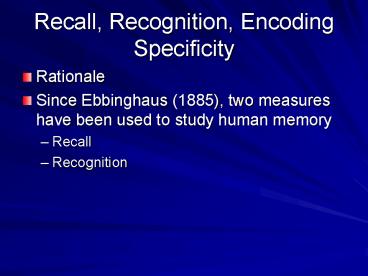Recall, Recognition, Encoding Specificity - PowerPoint PPT Presentation
1 / 15
Title:
Recall, Recognition, Encoding Specificity
Description:
Retrieval. no THC. Eich et al. (1975) Encoding. THC no THC THC. Retrieval. no THC. This week's experiment. Manipulate the amount of overlap in cues between ... – PowerPoint PPT presentation
Number of Views:254
Avg rating:3.0/5.0
Title: Recall, Recognition, Encoding Specificity
1
Recall, Recognition, Encoding Specificity
- Rationale
- Since Ebbinghaus (1885), two measures have been
used to study human memory - Recall
- Recognition
2
- Recall
- Free recall or Cued recall
- Subjects have to retrieve information
- Recognition
- Yes/No or Multiple Choice
- Subjects identify correct items among distractors.
3
Big Question
- What is the difference between these measures?
- A number of theories.
4
Strength Model
- The oldest.
- Claim
- The difference is the strength of memory trace
they require to be successful. - Recall requires stronger memory trace than
recognition.
5
- Support
- Recognition is often easier than recall.
- Problem
- Word frequency effect
- High frequency words are easier to recall than
low frequency words. - Low frequency words are easier to recognize than
high frequency words.
6
New Model
- Kintch (1971)
- Difference is the number of processes they
require. - Recall - Generate Recognition
- Recognition - Recognition
- Generate-Recognize model
- Support - Word Frequency Effect
7
But, is it?
- Tulving Thompson (1973)
- Maybe not.
- Whats wrong with it?
8
Which one is easier?
- Generate-Recognize model
- Recognition is easier than recall
- Recall generate recognition
- Recognition recogition
9
Can recall be easier than recognition?
- Generate-Recognize model
- No
- Recall generate recognition
- Recognition recognition
10
Tulving Thompson (1973)
- Phase I - Memorized the capitalized words.
- pretty - BLUE
- Phase II - Free association and recognition
- lake - water, ocean, blue, deep
- Phase III - Recall
- pretty - _________
11
Found
- Recall was easier than recognition.
- How can it be?
- The difference is not the type of processing.
- The difference is the amount of overlap in cues
between encoding and retrieval. - Often - overlap is greater for recognition than
recall - But - you can manipulate it to make recall easier.
12
Encoding Specificity
- Performance depends on the amount of overlap in
cues between encoding and retrieval. - Explain many phenomena
- State dependent memory
- Environmental reinstatement effect
13
Eich et al. (1975)
- Encoding
- THC no THC THC
- Retrieval
- no THC
14
Eich et al. (1975)
- Encoding
- THC no THC THC
- Retrieval
- no THC
15
This weeks experiment
- Manipulate the amount of overlap in cues between
encoding and retrieval. - Test - whether recall can be made easier than
recognition - If so - Encoding Specificity Hypothesis is
supported. - If not - Generate-Recognize model is supported.

